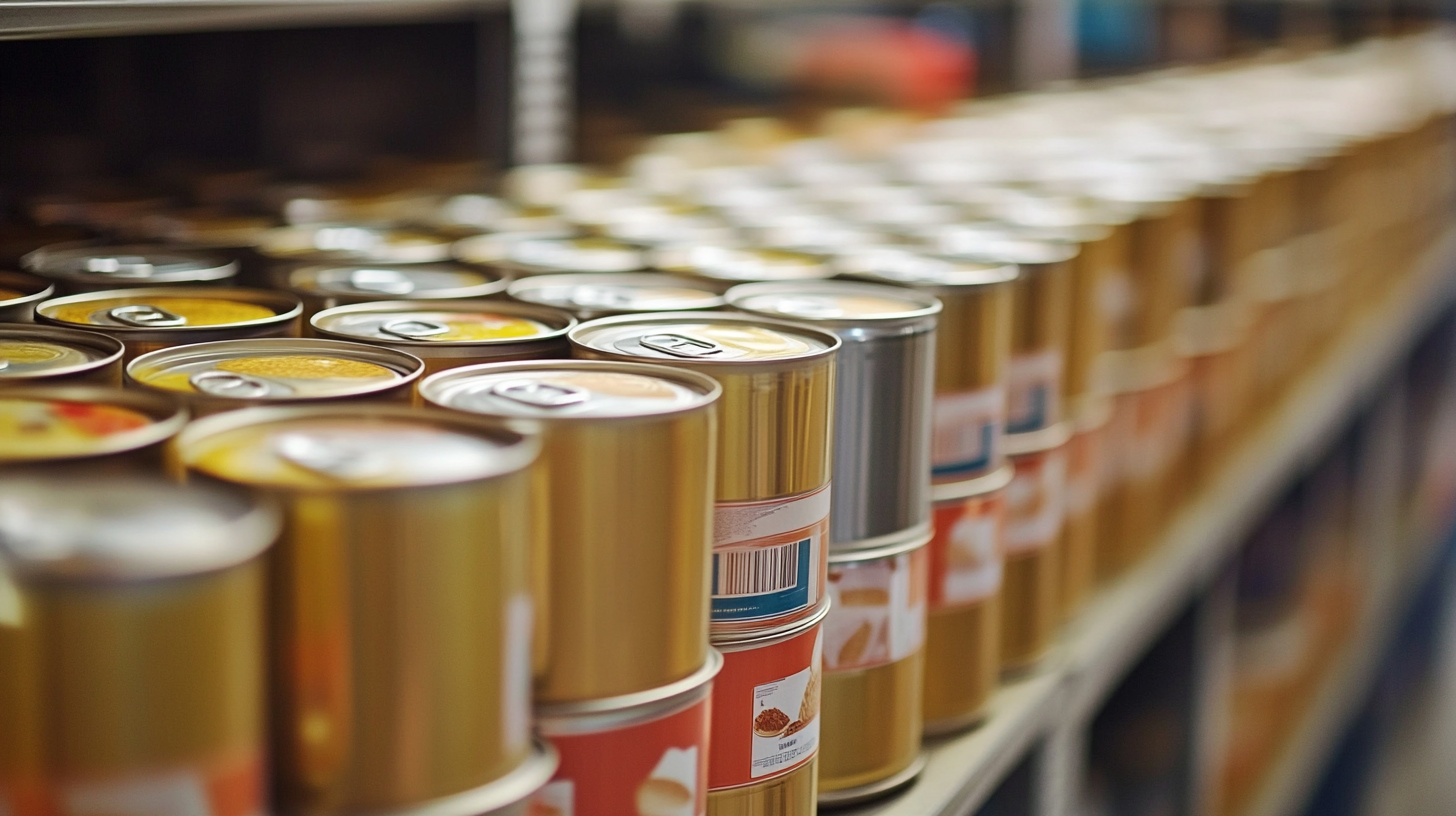 +8618680445103
+8618680445103
Free Standard Samples can be provided for you to check the quality.
Leave Your Message
In the dynamic landscape of global food distribution, the choice of packaging plays a pivotal role in preserving quality and extending shelf life. Food cans, with their robust structure and airtight seal, have become a cornerstone in the supply chain for food products. According to a report by Mordor Intelligence, the global canned food market is projected to reach USD 100 billion by 2025, driven by an increasing demand for convenient and long-lasting food options. The use of food cans offers numerous advantages, such as protection against spoilage, extended freshness without preservatives, and ease of transport. Furthermore, as consumers increasingly prioritize sustainability, the recyclability of metal cans positions them as an environmentally friendly choice, appealing to both eco-conscious buyers and wholesale distributors alike. This blog will explore the myriad advantages of different food cans, guiding global wholesale buyers in making informed decisions that align with market demands and consumer preferences.

Canned foods have long been a staple in global markets, offering significant advantages for long-term storage. One of the primary benefits of canned goods is their extended shelf life. Unlike fresh produce, which can spoil quickly, canned foods are preserved through a process that locks in nutrients and flavors, ensuring they remain safe to eat for years. This feature appeals especially to wholesalers who need to manage inventory efficiently and meet demand without the risk of wastage.
Moreover, canned foods provide immense convenience for consumers and retailers alike. They require no refrigeration, making them ideal for diverse climates and regions where access to cold storage may be limited. The ability to stockpile these items is particularly beneficial in times of emergency or crisis, where access to fresh food can be compromised. For global wholesale buyers, investing in a variety of canned food products not only diversifies their offerings but also assures customers that they will have reliable options that last, catering to health-conscious and practical consumers in every market.

When examining the nutritional value and cost-effectiveness of various types of canned food, it becomes clear that not all options are created equal. For instance, canned vegetables often preserve essential vitamins and minerals while providing a long shelf life, making them a staple for bulk buyers. These products not only deliver convenience but also ensure that consumers receive the nutrients necessary for a balanced diet, proving beneficial for both retail and food service applications.
On the other hand, canned proteins, such as tuna and beans, offer another layer of nutritional benefit. High in protein and often low in fat, these options are ideal for health-conscious buyers. They are also versatile for various meal preparations, which adds to their appeal as a cost-effective solution. Furthermore, the pricing of canned proteins is generally competitive, especially when sourced in bulk, making them an attractive alternative for wholesalers looking to maximize profit margins.
Ultimately, the selection of canned food should be guided by both nutritional content and economic viability. By conducting a thorough comparative analysis, buyers can make informed decisions that align with their needs and those of their customers, ensuring they stock their shelves with products that provide both quality and value.
As the global market increasingly emphasizes sustainability, the demand for eco-friendly food packaging has surged. Food cans, traditionally made from metals such as steel and aluminum, are evolving to meet these sustainability trends. Manufacturers are exploring innovative materials that reduce environmental impact while maintaining the integrity and freshness of food. Biodegradable linings and recyclable materials are just a few examples of how the industry is adapting to consumer preferences for greener options, making these products not only practical but also environmentally responsible.
Consumers today are more conscious than ever about the origins of their food and the materials that package it. This shift has compelled wholesale buyers to seek out suppliers who prioritize sustainable practices in their production processes. The use of food cans made from sustainable materials not only appeals to eco-minded consumers but also enhances brand reputation. By choosing to collaborate with eco-friendly manufacturers, wholesale buyers can influence positive environmental change while meeting the increasing demand for sustainable products in their markets.
In recent years, the canned food market has gained significant traction globally, driven by changing consumer preferences and growing health awareness. As people increasingly seek convenience and longer shelf-life options, canned foods provide a practical solution without sacrificing nutritional value. A recent analysis of the canned fruits market reveals an upward trend in consumption, with varieties like canned peaches, pears, and pineapples gaining popularity among health-conscious buyers looking for quick and healthy snack alternatives.
Moreover, the rise of functional foods within the canned segment highlights a shifting focus towards products that offer health benefits beyond basic nutrition. Advanced processing methods retain essential vitamins and bioactive compounds, making canned fruits not just a source of energy but also a contributor to overall well-being. With the global canned food industry embracing these trends, wholesalers have an exceptional opportunity to meet the demand for innovative and health-promoting canned products. Embracing this shift can help stakeholders remain competitive and cater to the evolving tastes of consumers worldwide.
| Canned Food Type | Advantages | Market Growth (% annual) | Key Regions |
|---|---|---|---|
| Vegetable Cans | Nutrient retention, Convenience | 5% | North America, Europe |
| Fruit Cans | Long shelf life, Versatility | 6% | Asia-Pacific, Latin America |
| Meat Cans | Protein source, Emergency food | 4% | Middle East, Africa |
| Seafood Cans | Omega-3 rich, Convenient | 7% | North America, Europe |
| Soup Cans | Quick meals, Variety | 5.5% | Global |
Quality control in food canning is paramount for global wholesale buyers who prioritize safety and freshness. With the increasing demand for canned foods, manufacturers must adhere to stringent quality assurance standards that cover every stage of the canning process. From sourcing raw ingredients to sealing them in durable, airtight containers, each step is crucial in preserving the natural taste and nutritional value of the food. By implementing rigorous testing protocols, suppliers can detect potential contaminants or spoilage before the products reach the market, ensuring that what buyers receive is safe and high-quality.
Moreover, effective quality control measures extend to the packaging itself. Cans must be designed to withstand various environments, maintaining their integrity during shipping and storage. Wholesale buyers benefit from partnering with companies that conduct regular audits and checks, which can significantly reduce the risk of product recalls. Investments in advanced technology, such as automated monitoring systems, further enhance quality control by allowing for real-time tracking of production consistency. By prioritizing these practices, food canning operations can provide wholesalers with products that meet consumer expectations for safety, freshness, and reliability, ultimately contributing to their brand’s reputation and success in the global market.

